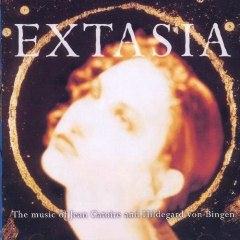Jean Catoire - Extasia (A Requiem Sequence) (1999)
Jean Catoire - Extasia (A Requiem Sequence) (1999)

Requiem, for unaccompanied women's voices with liturgical settings by Hildegard von Bingen (1098—1179) Requiem, for unaccompanied women's voices, Op. 537 1. Introit [4:49] 2. 1. Requiem aeternam [5:04] Interludes for organ, Op. 84 3. Interlude 1 [5:08] 4. O successores fortissimi, antiphon to the confessors [2:19] 5. O pater omnium, sinfonia for the widows [2:19] 6. 2. Offertorium [3:40] Requiem Antiphons, Op. 195 7. Antiphons 1-3 [2:15] 8. O vos imitatores excelse, response for the confessors [4:02] 9. 3. Sanctus [2:21] Interludes for organ, Op. 84 10. Interlude 2 [4:05] 11. 4. Agnus Dei [1:51] 12. O victoriosissimi, antiphon for the martyrs [3:32] Requiem Antiphons, Op. 195 13. Antiphons 4-6 [3:20] 14. 5. Lux aeterna [1:28] 15. O gloriosissimi lux vivens, antiphon for the angels [2:00] 16. Vos flores rosarum, response for the martyrs [5:25] Interludes for organ, Op. 84 17. Interlude 3 [8:23] 18. 6. Libera me [2:48] 19. Pater Noster [5:36] Helena Ek - soprano Emily Van Evera - soprano Catherine King - mezzo-soprano Wayne Marshall - organ Chapel Choir of Harrogate Ladies' College Harvey Brough - director
Spiritual purity transcends the ages, especially so in music. No better example of spiritual time travel exists than EXTASIA. EXTASIA is a fascinating juxtaposition of the music of the 12th-century German Abbess, Hildegard of Bingen and the music of contemporary French composer Jean Catoire. Catoire's 'Requiem' is a setting of the traditional Latin Mass for the Dead. Interspersed between the movements of the 'Requiem' are antiphons and responses by Hildegard, as well as organ interludes and plainsong by Catoire.
Rather than being filled with thunder and drama, Catoire's 'Requiem' is infused with a quiet passivity that is hypnotic. Catoire's work reminds one of the gentle settings of Fauré and Duruflé. Hildegard's antiphons provide stunning counterpoint to Catoire's music, creating an austere yet emotionally compelling sonic picture. The Chapel Choir of Harrogate Ladies' College make the very most of this music. They sing with warmth, crystal clear articulation, and tonal beauty. Wayne Marshall is brilliant in the reverent organ interludes, and conductor Harvey Brough directs the ensemble with soul. This is a must-have recording for all who are fascinated by the Middle Ages as well as those who admire the music of Pärt and Gorecki. ---Notes and Editorial Reviews, arkivmusic.com
Jean Catoire (01/04/1923 - 09/11/2005), a French composer. He was born in Paris of Russian émigré parents whose origins were French and German. Catoire's musical thought is essentially Pythagorean: it is the laying bare of pure musical sound, in which a worldly concern for the language of words and the rhythms of speech are of no consequence. As a 'music of the spheres' it recognises only the resonance and pulse of pure-being perceived in sound.
The requiem antiphons (opus 195), for solo voice and bells, are extremely austere, with a slow-moving melody that's haunting and somewhat disorienting. In this company, Hildegard's soaring melodies sound almost luxuriant.
The requiem antiphons (6 movements) of 1970 display a music which is pure, exact and impassive ; yet it is a music which remains sensual. Unlike Arvo Part's beautiful but austere and fragile style Catoire's impassivity is immediately and unashamedly appealing. The 'Introit' refrain, which opens and closes the Requiem and recurs frequently throughout, is as beguiling as any moment from the Requiems of Fauré or Duruflé; unlike these, however, it never loses itself in the drama or sentiment of its text.
This recording (Extasia - A Requiem Sequence, Virgin records, 1999) explores musical space and stillness by uniting the spirituality of two millennial ages. It brings together for a first time the extraordinary work of the contemporary French composer, Jean Catoire, and that of the twelfth-century German abbess, Hildegard Von Bingen. They meet on this disc with a requiem by Catoire providing a frame-work for Hildegard's ecstatic 'Antiphons' and 'Responds'. Alongside are plainsong, organ Interludes and meditative 'Requiem Antiphons', all by Catoire, to complete the sequence. Though distinct in voice and style and distanced by over eight hundred years, the creative instincts of Catoire and Hildegard are strangely akin. ---requiemsurvey.org
download (mp3 @320 kbs):
yandex mediafire ulozto gett bayfiles








